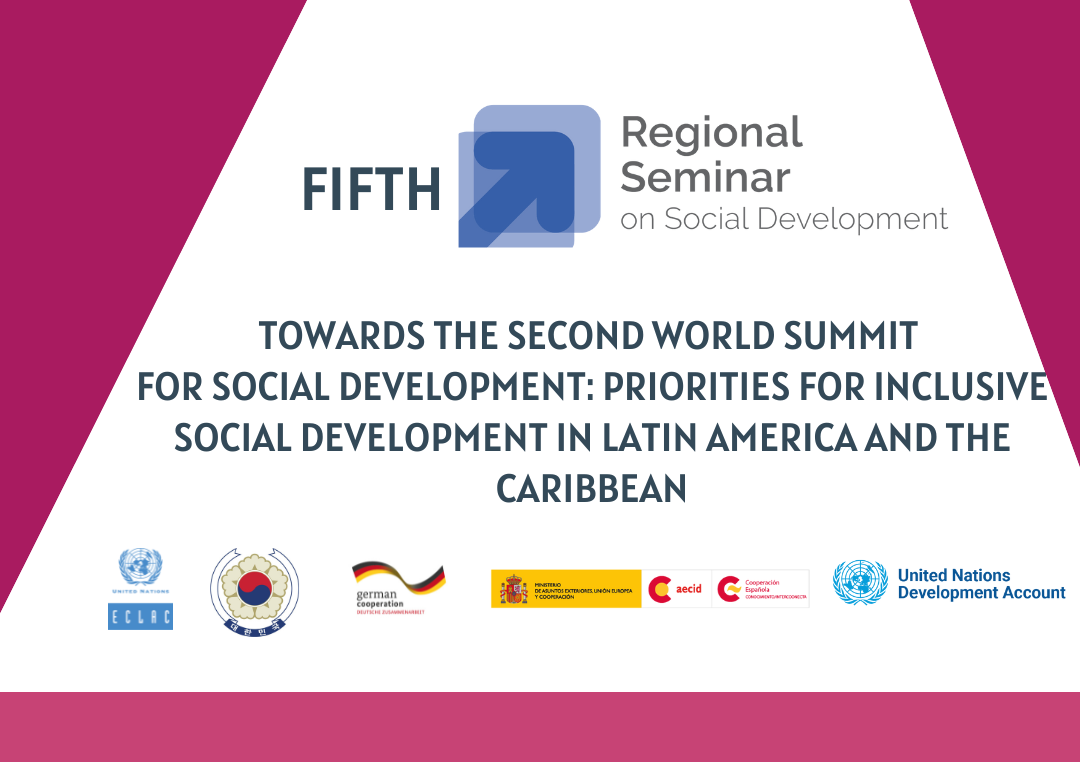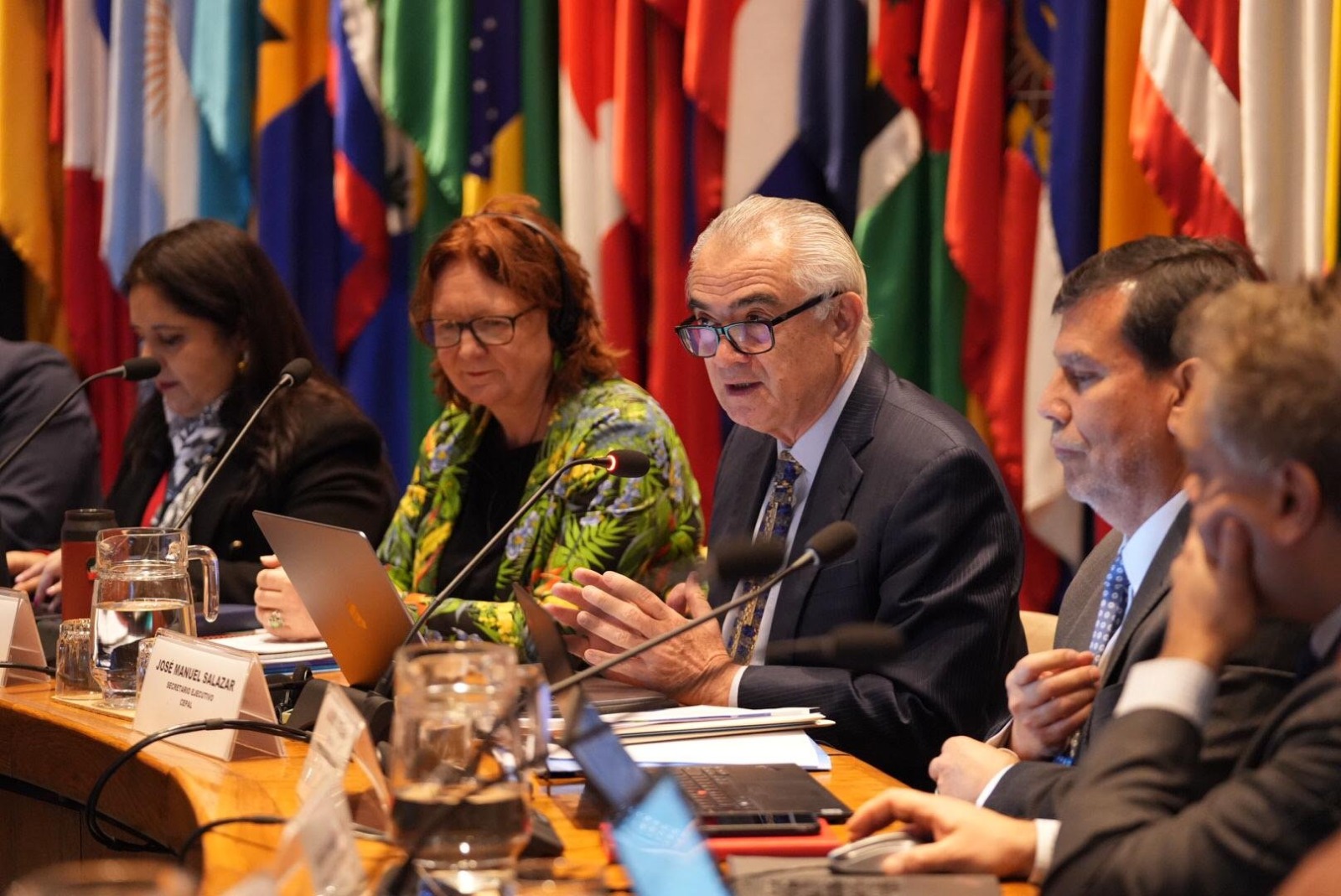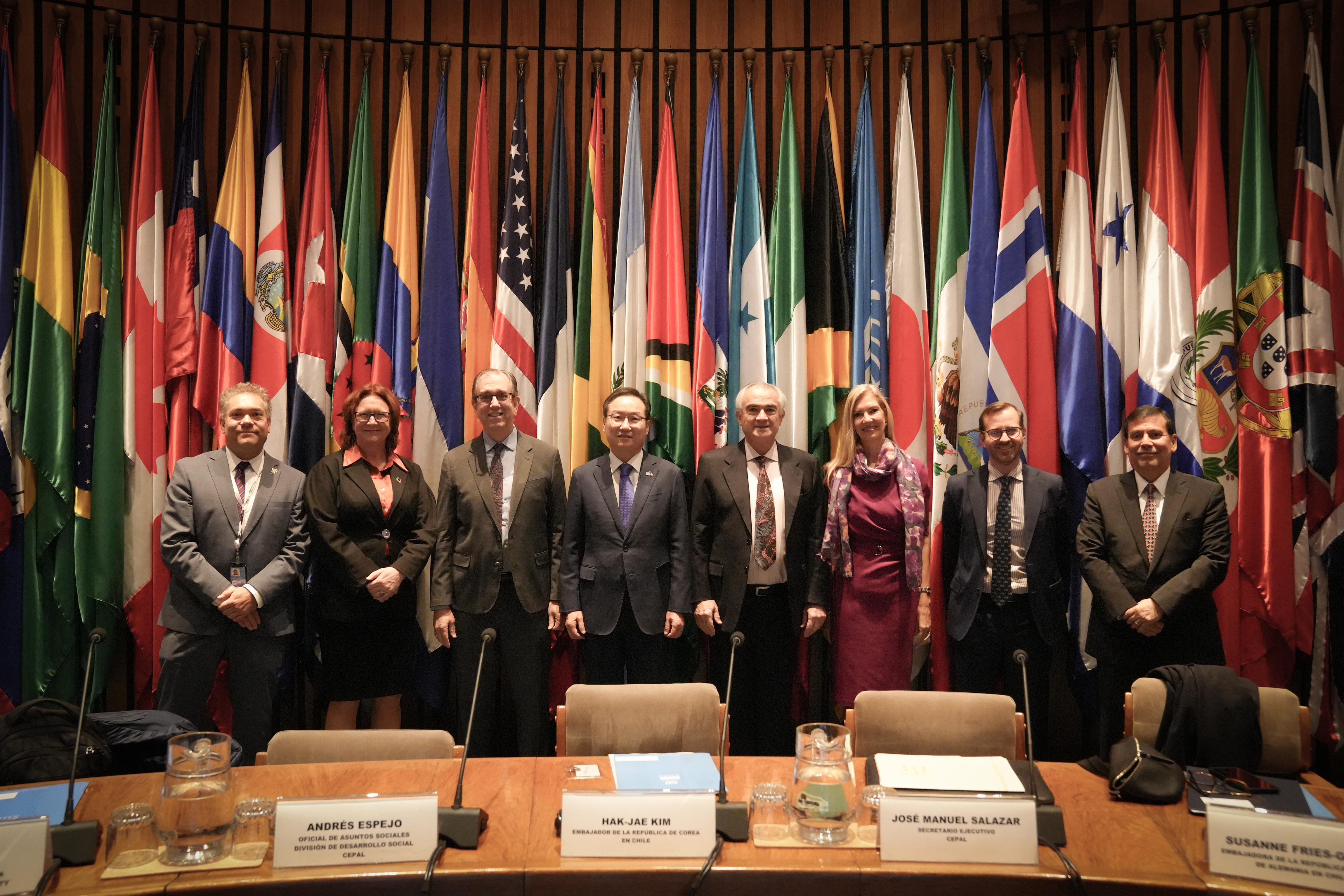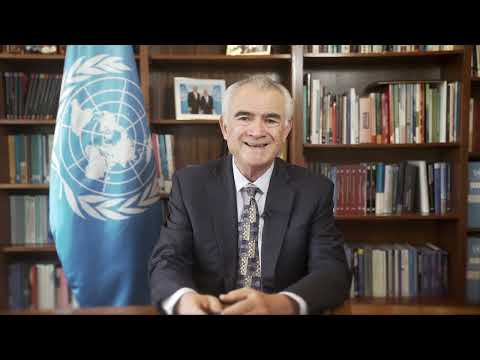Fifth Regional Seminar on Social Development
Work area(s)
Event information

Date
24 - 26 Jun 2025, 09:00 - 16:45Event type
Participation
BACKGROUND
Since the 1995 World Summit on Social Development in Copenhagen, the global agenda on social development has advanced significantly, not only on a deeper understanding of challenges such as well-being, poverty, inequality, and discrimination, but also on a growing emphasis on upholding economic, social, and cultural rights. Within this evolving framework, the changes, ambition and commitment of countries have been notable. The 2030 Agenda for Sustainable Development and the Regional Agenda for Inclusive Social Development in Latin America and the Caribbean stand as compelling examples of the determination of States to drive inclusive social development, in alignment with the economic and environmental dimensions of sustainability.
However, structural challenges persist, and recent global crises - including the COVID-19 pandemic, armed conflicts, climate change, technological transformations, and demographic transitions - have exacerbated pre-existing inequalities. These challenges underscore the urgency of implementing transformative social policies that not only address immediate crises but also tackle the structural vulnerabilities prevalent in Latin America and the Caribbean.
The road to the Second World Summit for Social Development presents a pivotal opportunity to reaffirm and enhance these commitments. It allows for a reinvigoration of the inclusive social development agenda through a forward-looking perspective, prioritizing the unique needs and aspirations of Latin America and the Caribbean. This process aligns with broader global efforts, such as the Summit of the Future, which seeks sustainable and inclusive solutions to today’s pressing challenges.
In this context, the Fifth Regional Seminar on Social Development takes this global milestone as a reference to addressing a series of key issues in depth and with a forward-looking perspective. Among them, overcoming the region’s developmental traps, fostering essential transformations, and tackling high levels of inequality, limited social cohesion and mobility, and the structural and emerging risks that characterize the region.
The Seminar aims to create a space for dialogue and analysis, bringing together specialists, think tanks, civil society representatives, and high-level social development authorities. The goal is to produce strategic insights that go beyond diagnosing challenges to propose actionable recommendations. These include inclusive social policies, universal and comprehensive social protection systems that are sustainable and resilient, and mechanisms to strengthen social cohesion.
In addition, the results of this discussion space are conceived as a key contribution to strengthening the position of Latin America and the Caribbean at the Second World Summit for Social Development. This will allow the region to reaffirm its commitment to inclusive development and place strategic priorities, such as the fight against inequalities, the promotion of care policies and investment in human capabilities at the center of the global agenda.
Finally, this process is part of a broader effort to consolidate Latin America and the Caribbean as a leading region in the promotion of inclusive and forward-looking social development, in synergy with the international dialogues around the Sustainable Development Goals and the Summit of the Future.
Programme of work
DAY1 Inauguration
Moderator: Alberto Arenas de Mesa, Director of the Social Development Division, ECLAC.
- José Manuel Salazar-Xirinachs, Executive Secretary, ECLAC
- Susanne Fries-Gaier, Ambassador of the Federal Republic of Germany in Chile
- Hak-Jae Kim, Ambassador of the Republic of Korea in Chile
- Laura Oroz Ulibarri, Director, Directorate of Cooperation with Latin America and the Caribbean, Spanish Agency of International Cooperation for Development (AECID) (videomessage)
Presentation(s)
Keynote Address “Addressing Inequality: Pathways to Inclusive Social Development”
Moderator: Andrés Espejo, Social Affairs Officer, ECLAC.
- Dr. James Foster, Professor of International Affairs and Economics, George Washington University.
Presentation(s)
High-Level Panel
The Latin American and Caribbean Pact for Inclusive Social Development: Heading Towards the Second World Summit on Social Development
Moderator: Alberto Arenas de Mesa, Director of the Social Development Division, ECLAC.
Presentation of ECLAC’s Policy Brief “The road to the 2025 Second World Summit for Social Development: towards a pact for inclusive social development”. José Manuel Salazar-Xirinachs, Executive Secretary, ECLAC
- Javiera Toro, Minister of Social Development and Family, Chile
- Mark Franklin, Permanent Secretary, Minister of People Empowerment and Elder Affairs, Barbados
- Bjørg Sandkjær, Assistant Secretary-General, Department of Economic and Social Affairs, United Nations (DESA)
- Sophie De Smedt, Permanent Representative of Belgium to the UN, co-facilitator of the Second World Summit on Social Development, also representing the Permanent Representative of Morocco to the United Nations, Omar Hilale (videomessage)
Presentation(s)
Side event: "Laying the Foundations for a Regional Proposal on the Multidimensional Measurement of Social Inequality”
Presentation(s)
Panel I: Inequality, Social Cohesion, and Inclusive Social Development Policies
The concept and measurement of social cohesion in Latin America reveals numerous challenges in multiple areas of public policy and institutionality. The objective of this panel is to reflect on the need to advance in the discussion of priority policy areas to consolidate welfare guarantees and democratic governance to overcome the trap of high inequality and low mobility and social cohesion in the region, as well as the institutional challenges to move towards inclusive social development that addresses the needs and rights of specific population groups.
Moderator: Rodrigo Martínez, Senior Social Affairs Officer, ECLAC.
Presentation: "The trap of high inequality and low social cohesion: policy priorities for an inclusive Social Development Pact", Carlos Maldonado, Social Affairs Officer, ECLAC
Comments:
- Diego Spottorno, Technical Advisor for the Andean and Southern Cone Countries Unit, Spanish Agency for International Development Cooperation (AECID)
- Marcela Ríos, Director for Latin America and the Caribbean, International Institute for Democracy and Electoral Assistance (International IDEA)
- María Luisa Méndez, Director, Center for the Study of Conflict and Social Cohesion
Presentation(s)
Side Event Presentation of the document “Education and the development of digital competences in Latin America and the Caribbean”
Presentation(s)
DAY 2 Keynote Address: “Emerging Issues in Inclusive Social Development Policies: A Life-Cycle Perspective from Childhood and Demographic Transitions”
Moderator: Carlos Maldonado, Social Affairs Officer, ECLAC
- Dr. Silvia Giorguli, President of El Colegio de México
Presentation(s)
Panel II: Poverty, Hunger, and Inequality: Innovative Responses to Persistent Challenges
The panel seeks to address the persistent challenges of poverty, hunger, and inequality, which continue to affect millions of people globally and in the region. Through the participation of representatives from governments, UN agencies, and specialists, the aim is to generate a multidimensional dialogue that fosters innovative and sustainable solutions. The objective is to highlight the urgent need for action and to identify effective responses from government policies, international cooperation, and community initiatives aligned with the commitments of the 2030 Agenda and the Regional Agenda for Inclusive Social Development, as well as the multiple dimensions of hunger and malnutrition.
Moderator: Ernesto Espíndola, Senior Research Assistant, ECLAC
Presentations:
- Intervention by Minister Wellington Dias, Ministry of Development and Social Assistance, Family and Fight Against Hunger, Brazil (videomessage)
- Global Alliance Against Hunger and Poverty, Leonardo Kazuo, General Coordinator of International Affairs, Ministry of Development and Social Assistance, Family and Fight Against Hunger, Brazil
Comments:
- Perspectives on the cost of malnutrition and financial sustainability, Rodrigo Martínez, Senior Social Affairs Officer, ECLAC
- Lynett Ochuma, Director of Social Development, Department of State for Social Protection and Elderly Affairs, Kenya
- Francisco García, Head of Cooperation, EU Delegation, Chile
- Mehrinaz El Awady, Cluster Leader, Gender Justice, Population and Inclusive Development, ESCWA (videomessage)
Presentation(s)
Panel III: Childhood: Promoting Institutional Capacity and Investment in Inclusive and Productive Social Development
The panel aims to highlight the crucial importance of early life investment as a foundation for inclusive social development and long-term productive growth, addressing the gaps between scientific knowledge, political commitments and public policies in this area. Panelists will discuss innovative approaches and strategies that promote strong institutions and effective investment in children and adolescents, facilitating a successful transition to productive development in adulthood. Experts in financial management and comprehensive child development policies will share case studies and experiences from various countries, providing key recommendations on public investment and policy frameworks that support this vital stage of the life cycle.
Moderator: Claudia Robles, Social Affairs Officer, ECLAC.
- Investing in childhood as a priority for Inclusive Social Development, Daniela Trucco, Senior Social Affairs Officer, ECLAC.
- Silvia Giorguli, President of El Colegio de México.
- Elias de Sousa Oliveira, Director of Basic Social Protection Department, Ministry of Development and Social Assistance, Family and Fight against Hunger, Brazil
- Tuanny Karen Souza Ramos, General Coordinator of Intersectoral Programs, Ministry of Development and Social Assistance, Family and Fight against Hunger, Brazil
- Milagros Nores, Co-Director for Research, National Institute for Early Education Research, Graduate School of Education, The State University of New Jersey
Presentation(s)
Side Event "Social Cohesion in Latin America: Social Institutions Regarding Indigenous Peoples and Meaningful Youth Participation"
Presentation(s)
Panel IV: Strategies for moving towards universal health
The panel aims to address the urgent need to strengthen health systems as a fundamental pillar for productive, inclusive and sustainable development. It will discuss the importance of ensuring universal health, overcoming economic, socio-cultural and organizational barriers, and integrating primary care into effective and sustainable health networks. In addition, it will explore how coordination between health policies and other components of social protection is essential to reduce inequalities and improve resilience to health emergencies, thus ensuring a rapid and efficient response to global and regional crises.
Moderator: Amalia Palma, Senior Research Assistant, ECLAC
- "The dimensions of health system reforms to move towards universal healh", Maria Luisa Marinho, Social Affairs Officer, ECLAC
- Luis Raúl Chapa Mejía, Head of the Reproductive Health Division in the Coordination of Integral Health Care of the IMSS Well-being Program Unit, Mexican Social Security Institute (IMSS)
- Jenny Pilar Torres, Head of the Office of Planning and Sectorial Studies, Ministry of Health of Colombia
- Bernardo Martorell, Undersecretary of Health Care Networks, Ministry of Health, Chile
- Donato Camey, Vice-Minister of Primary Health Care, Guatemala
- Ernesto Báscolo, Chief of the Unit of Primary Health Care and Integrated Health Services, PAHO
Presentation(s)
Evento paralelo "La inclusión laboral resiliente frente a los nuevos riesgos: el cambio climático y las emergencias complejas en sociedades desiguales"
Presentation(s)
DAY 3 High-Level Roundtable: On the Path to the Second World Summit for Social Development: Global and Regional Commitments for Inclusive Social Development
The Roundtable brings together representatives from regions around the world to present their priorities and commitments undertaken in the framework of the Second World Summit on Social Development. This space will highlight, in particular, the contributions and commitments of Latin American countries, in dialogue with other regions, to advance a global agenda that addresses inequalities and promotes collective well-being. Participants will share their perspectives on how these commitments can strengthen international cooperation and lay the groundwork for more inclusive public policies, marking a milestone in the implementation of agreements to be adopted during the Summit.
Moderator: Alberto Arenas de Mesa, Director of the Social Development Division, ECLAC
Presentation: Common priorities and commitments towards the Second World Summit for Social Development, Bjørg Sandkjær, Assistant Secretary-General, Department of Economic and Social Affairs, United Nations (DESA)
Roundtable:
- José Manuel Salazar-Xirinachs, Executive Secretary, ECLAC
- Claver Gatete, Executive Secretary, UNECA
- Lin Yang, Deputy Executive Secretary, ESCAP
- Tatiana Molcean, Executive Secretary, UNECE
- Rola Dashti, Executive Secretary, ESCWA (videomessage)
Presentation(s)
Keynote Address: Digital Inclusion: Advances and Obstacles to Inclusive Social Development
Moderator: Amalia Palma, Senior Research Assistant, ECLAC
- Dr. Jong Sung Hwang, President of the National Information Society Agency (NIA) of the Republic of Korea
Presentation(s)
Panel V: Digital Transformation and Inclusive Social Development: Opportunities and Challenges for Inclusion in Latin America and the Caribbean
The expansion of the digital transformation has effects in all areas, modifying production and consumption paradigms, as well as the way in which people relate to each other and develop in society. These transformations are particularly relevant for highly unequal societies such as those of Latin America and the Caribbean. In this context, the objective of this panel is to discuss the challenges faced by the population to take advantage of the opportunities of the digital transformation, and to reflect in particular on the challenges of public policy so that the digital transformation does not widen the already existing gaps in a highly unequal region.
Moderator: Mariana Huepe, Social Affairs Officer, ECLAC
- "Inequality and Digital Inclusion", Amalia Palma, Senior Research Assistant, ECLAC
- Sebastián Rovira, Economic Affairs Officer, ECLAC
- Ellen Helsper, Professor of Digital Inequalities, London School of Economics
- María Alejandra Menaldo, Vice Minister of Policy, Planning and Evaluation, Ministry of Social Development of Guatemala
Presentation(s)
Side event "Intersectionality in Health: National Experiences in Latin America"
Side event "Intersectionality in Health: National Experiences in Latin America"
Presentation(s)
Panel VI: Social Protection and Labour Inclusion: Sinergies for an Inclusive Social Development
In a region characterized by high levels of inequality, low mobility and limited social cohesion, structural deficits in social protection systems are further weakened by high levels of labor informality, insufficient access to decent jobs and the accelerated transformations underway, including those imposed by climate change. In this context, a systemic analysis to identify synergies between social protection and labor inclusion is essential. The objective of this panel is to reflect on policy options to strengthen these synergies, seeking to reinforce both areas in a reciprocal manner, consolidating mechanisms that not only improve economic security, but also promote inclusive and sustainable social development.
Moderator: Nincen Figueroa, Social Research Assistant, ECLAC
Presentation “Synergies between Social Protection and Labor Inclusion”, Claudia Robles, Social Affairs Officer, ECLAC, within the framework of the CEPAL-BMZ/GIZ Project 'Economically, Productively, Ecologically, and Socially Just Transformation'.
Comments:
- Jesus Baldeón, Vice-Minister of Employment Promotion and Job Training, Peru
- Noemi Arboleda, Coordinator, ‘Supérate’ program, Dominican Republic
- Pedro Kumamoto, Secretary General, Inter-American Conference on Social Security
Presentation(s)
Closure
- Alberto Arenas de Mesa, Director of ECLAC's Social Development Division
Presentation(s)
Related content

Con diálogo interregional que puso de relieve la centralidad de un Pacto mundial por el desarrollo social inclusivo, finalizó el Quinto Seminario Regional de Desarrollo Social
Durante tres días, autoridades y especialistas participaron de forma híbrida en encuentro organizado por la CEPAL, enfocado en el proceso preparatorio regional hacia la Segunda Cumbre…

ECLAC: The World Urgently Needs a Pact for Inclusive Social Development
Today the Fifth Regional Seminar on Social Development in Latin America and the Caribbean was inaugurated in Santiago, Chile.

Secretario Ejecutivo de la CEPAL invita a participar en el V Seminario Regional de Desarrollo Social
Video del Secretario Ejecutivo de la CEPAL, José Manuel Salazar-Xirinachs, invitando a seguir los debates del Quinto Seminario Regional de Desarrollo Social de América Latina y el Caribe, que…

Attachment(s)
Meeting documents
-
The road to the 2025 Second World Summit for Social Development: towards a pact for inclusive social development
Empleos verdes y sistemas de protección social: aportes a la transformación del modelo de desarrollo
Educación y desarrollo de competencias digitales en América Latina y el Caribe
Juventudes y cohesión social: una hoja de ruta para la participación significativa de las personas jóvenes en América Latina
Panorama de la institucionalidad social de los Pueblos Indígenas y su aporte a la cohesión social de América Latina
Related project(s)
Organizing institution
Economic Commission for Latin America and the Caribbean (ECLAC)
- https://www.cepal.org
- 56 222100000

